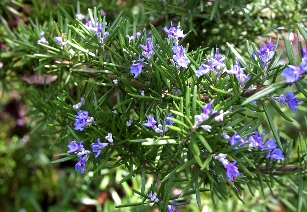| |
Rosemary (Rosmarinus officinalis)
 |
Rosemary helps minimize the effects of aging on your
skin
One of
the traditional uses of rosemary is as a cosmetic. Recent research findings have
now confirmed the skin-protective benefits it possesses.
According to researchers working at the Faculty of
Medicine, University of Catania, in Italy, rosemary extract helps protect the
individual components of skin cells, which may prevent age-related skin damage
such as wrinkles.
In a follow-up study
the Italian researchers found that rosemary extract is able to exert even
greater benefits. In particular, it was shown to safeguard a protective protein
called HSP70. The role of this protein is to reduce damage caused by stress,
free radicals and other toxins on the skin.
Rosemary helps to disarms harmful toxins and flushes
them from your body.
Another benefit
rosemary extract has been shown to possess is an ability to inactivate toxins
and then eliminate them from your liver, before they can inflict any serious
damage.
French scientists from the National Institute of
Agronomic Research in Dijon, found that rosemary extract encouraged detoxifying
enzymes - including cytochrome P450, glutathione transferase and quinone
reductase - to flush harmful toxins from the liver.
In effect, rosemary stimulates your liver to work more
efficiently, which helps you feel more healthy and energetic.
Applied to the skin,
rosemary essential oil helps strengthen the capillaries and has a rejuvenating
effect. For this reason, rosemary is a common ingredient used in many cosmetics,
including skin toners, creams, soaps and hair products.
However, beyond being a flavoring-enhancer for
certain foods and its use in cosmetics, you may not be aware that rosemary
extract has a long history of medicinal uses too. It has been used to treat a
wide range of ailments, including stomach upsets, digestive disorders and
headaches.
Recent research is now
revealing even more benefits attached to this remarkable herb, including its
ability to help prevent age-related skin damage, boost the
functioning of the liver and act as a mild diuretic to help reduce swelling.
Two of the most important ingredients in rosemary,
which are thought to be largely responsible for many of these therapeutic
actions, are caffeic acid and rosemarinic acid - both are potent antioxidant and
anti-inflammatory agents.
These two natural
acids are effective at reducing inflammation which may contribute to asthma,
liver disease and heart disease.
The antioxidants
contained in rosemary help to protect your body's cells from damage by free
radicals. They include monoterpenes, phenolic diterpenes and flavonoids, which
are renowned for their ability to slow down the production of free
radicals.
It is also a rich
source of vitamin E (alpha tocopherol), another potent antioxidant, which
contributes to its free radical fighting powers further still.
DNA is your genetic blueprint, and it is particularly
prone to injury from free radicals. Left unchecked, this damage can eventually
lead to cells proliferating out of control, which greatly increases the risk of
cancer.
Scientists from the department of Mutagenesis and
Carcinogenesis, Cancer Research Institute of Slovak Academy of Sciences, in the
Slovak Republic, have found that rosemary extract can significantly help to
protect DNA against free radical damage.
Rosemary oil is one of the most popular essential
oils. It has become important to us due to its various health benefits including
its ability to stimulate hair growth, boost mental activity, relieve respiratory
problems and reduce pain.
Rosemary, also known
as Rosmarinus Officinalis, is very popular in the Mediterranean region as a
culinary herb. Many dishes are cooked with rosemary oil and freshly plucked
rosemary leaves. Rosemary essential oil is mostly extracted from the leaves.The
rosemary bush belongs to the mint family which includes basil, lavender, myrtle,
and sage.
Rosemary has been
extensively used since ancient times for a variety of purposes. The Romans gave
special importance to rosemary plant and used it in religious ceremonies. Its
use extended to wedding ceremonies, food, cosmetics, and herbal care. Rosemary
plant and its extract were also used in the ancient Egyptian civilization as
incense.
The health benefits of rosemary essential oil made it
a favorite of Paracelsus, a renowned physician, who made significant
contribution to herbal medicine during the sixteenth century. Paracelsus valued
rosemary oil due to its ability to strengthen the entire body. He (rightly)
believed that rosemary oil had the ability to heal delicate organs such as
liver, brain as well as heart.
Today, many medicinal
preparations contain rosemary oil. The various health benefits of rosemary oil
are given below:
Hair Care: Rosemary
oil and rosemary teas are used extensively for hair care in shampoos and
lotions. Regular use of rosemary oil helps in stimulating follicles, as a result
of which, hair grow longer and stronger. It is also believed that rosemary oil
slows down premature hair loss and graying of hair. Hence it is an excellent
tonic for bald people. Rosemary essential oil is also beneficial for dry and
flaky scalps. Regular massage of scalp with rosemary oil nourishes the scalp and
removes dandruff. Further, it is often mixed with tea tree oil and basil oil to
treat scalp problems.
Mouth Care: Rosemary essential oil is a disinfectant
and is used as a mouth wash. It also helps in removing bad breadth.
Skin Care: Rosemary
essential oil is not used in skin care as extensively as it is used in hair
care. Regular massage with the oil helps in toning your skin and removing
dryness. It is also considered as a beauty aid for the face.
Boost Mental Activity:
Rosemary essential oil is an excellent brain and nerve tonic. It is often used
by students during exam times as it increases concentration and helps in
studying efficiently. It stimulates mental activity and is a good remedy for
depression, mental fatigue and forgetfulness. Inhaling rosemary oil lifts your
spirits immediately. Whenever your brain is tired, inhale rosemary oil to remove
boredom and get fresh mental energy.
Pain Relief: The ability of rosemary essential oil to
relieve pain has resulted in its extensive usage in headaches, muscle pains,
sore muscles, rheumatism and even arthritis. Massaging the part which is in pain
with rosemary essential oil give relief from the pain. Vapor baths with rosemary
oil is found to be effective for rheumatism.
Aroma: Rosemary has a
mesmerizing aroma and hence rosemary essential oil is an excellent inhalant. The
oil is used in room fresheners, cosmetics, beauty aids, food, bath oil, candles
and perfumes due to its aroma. The oil, when inhaled brings mental energy and
also clears the respiratory tract. Many people spray mixture of rosemary
essential oil and water to remove bad odor from room.
Respiratory Problems:
The benefits of rosemary essential oil in treating respiratory problems are
unmatched. The scent of the oil gives relief from throat congestion. The oil is
used in treating respiratory allergies, cold, sore throat and flu. Since
rosemary oil is antiseptic it is effective for respiratory infections as well.
The oil is antispasmodic and is used in bronchial asthma.
Indigestion: Rosemary
oil is often used for indigestion, flatulence and stomach cramps. Rosemary
leaves are often added to meat dishes as it helps in digesting meat, especially
lamb, beef and pork.
Rosemary oil may, at times, have allergic reactions
and hence it should be used only with prescription. Since rosemary oil is
volatile in nature, the oil may cause vomiting and spasms. Hence it should not
be consumed orally. It is suggested that rosemary essential oil should not be
used by pregnant and breastfeeding or nursing women. Excessive dosage of the oil
may lead to miscarriage or may affect the fetus.
Rosemary essential oil is used extensively in
aromatherapy as it can be used in many preparations. The oil blends well with
frankincense, lavender, clary sage, cedarwood, basil, thyme, citronella,
lemongrass, elemi, geranium, chamomile, peppermint and
cardamom.
Rosemary Oleoresin Extract (ROE).
Rosemary Oleoresin, also known as Rosemary Oil Extract or ROE is an oil soluble, natural extract used to retard rancidity in natural oils. Its potent antioxidant properties are attributed in large part to carnosic acid, one of its major constituents. Rosemary Oleoresin is available with varying levels of carnosic acid. Ours is highly concentrated and standardized to 7% carnosic acid for the highest level of activity, making its use at very low percentages both effective and economical. Typically, 0.2 - 0.5 grams will be added to 1000 grams of oil.
As with any antioxidant, to be effective Rosemary Oleoresin must be added to oils when they are fresh, before oxidation has started. Additionally, it must be thoroughly dispersed in the oil. As Rosemary Oleoresin is a thick liquid, adequate dispersion can be difficult. We recommend it be predispersed in a small portion of the oil first and this added to the balance of the oil with thorough mixing.
Rosemary Oleoresin (ROE) has a very mild herbaceous odor which is generally unnoticeable in final formulations when used at recommended usage levels. It is a high quality product lacking the pulp or graininess often found in lesser Rosemary Oleoresin products. In addition to Carnosic Acid, Rosemary Oleoresin also contains Rosmarinic Acid, Rosmaridiphenol, Carnosol, Rosmanol, and Rosmaridiquinone.
Disclaimer: The information presented herein is intended for educational
purposes only. These statements have not been evaluated by the FDA and are not
intended to diagnose, cure, treat or prevent disease. Individual results may
vary, and before using any supplements, it is always advisable to consult with
your own health care provider.
|
|


















